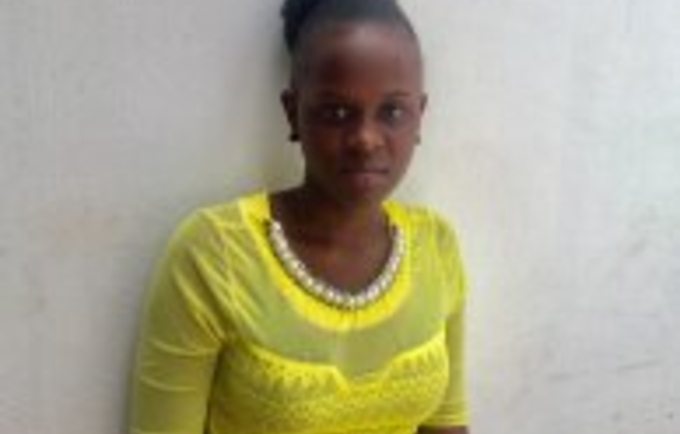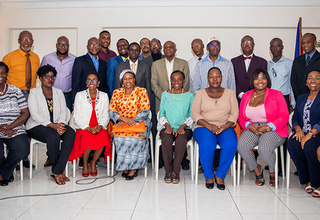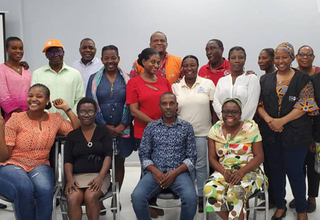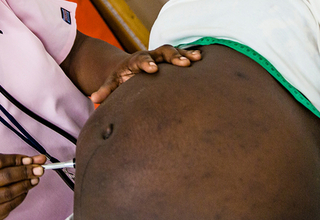Monique Clesca
UNFPA | Former Representative
July 26, 2017
This piece was originally published in French in Le National.
They are 14-, 16-, and 17-year-old children in Haiti. Their adolescent lives fell apart when they got pregnant—putting their education, their future, and their lives in danger.
Jessica
Jessica was 13 years old when she fell madly in love with her boyfriend. She hadn't even started puberty. He was 17 and lived in the neighborhood of Meyotte in Petion Ville. She told her adoptive mother about their relationship, but she forbid Jessica from seeing her boyfriend at home and told her to concentrate on her studies. Jessica’s big dream was to be a stewardess and manage a small business, up until the day she fell pregnant at 16. Then, her whole world fell apart.
To celebrate her boyfriend's birthday, they made love in his bedroom. Although she knew the risk because "the [biology] teacher always told us that we could get pregnant after sexual contact," she never thought it could happen to her. Today, at 18, Jessica is the mother of one-and-a-half-year-old Melly Georgia. Jessica left school during 11th grade because of her pregnancy; she tried to return last September, but had to miss the year because of a massive infection that landed her in the hospital for weeks. She has now lost three years of school.
"I want to go back to my old life, when things were easy. Then, I was fine and had no problems," says Jessica, who wears her hair in an Afro bun that accentuates her beautiful round face and almond-shaped eyes.
Joanna
Joanna was 17 when she met her boyfriend. Six months later, after a Valentine's Day outing at the beach and a few drinks of klerin, a local alcoholic beverage, she had her first sexual contact with him. Everything seemed fine, except she got pregnant. At that time, she was living with her diabetic mother in Peguy-Ville, in the outskirts of the capital city Port-au-Prince; her father had died when she was three. And then, tragedy set in. During her pregnancy, she had to bury her boyfriend who died in a terrible Mardi Gras accident that killed up to 20 people including several members of a popular hip-hop band. Finally, happiness arrived with the birth of a daughter by cesarean, who she named Darly.
Joanna is a medium-tall girl with a long neck and cornrows. She is as skinny as her daughter. Her tiny eyes are sad, infinitely sad. Sad because her mother, who had five children and a small business, died a few months after Darly's birth. Sad because the sister who had lodged her since her mother's death threw her out, along with Darly. Sad because she found herself either begging or selling beer in a local park, sometimes sleeping at a girlfriend's house. It was misery.
You only need to see her walk to understand that Joanna is the embodiment of fragility. She says with a barely audible voice, "If only I had listened to my mother, who had told me not to listen to friends who were inviting me to parties, I wouldn't be in this mess." Joanna had dreams of being a doctor, but today at 20, all of that is forgotten. That period of her life seems so very far away, and the bitterness is palpable.
Rose-Mirtha
Rose-Mirtha was 14 when catastrophe struck. After the 2010 earthquake, her family provided emergency lodging to a 45-year-old father of two, who was also a schoolteacher. One morning, he raped her. He told her that she shouldn't say anything, and her family was never to know what happened. He threatened to rape her again if she told her family. The secret was safely guarded until a few months later, when her family discovered that she was pregnant. (According to a recent study done by Haiti's GHESKIO Center, 17% of adolescents who are raped fall pregnant.) That's when her family took her to KayFanm, an NGO that has provided holistic support to survivors of domestic and sexual violence during the last 20 years.
Rose-Mirtha went through some very painful moments. First, there was the psychological shock stemming from the rape. Then, she had to adjust to living far from her family, who had chosen to leave her at KayFanm, where she would stay for four years. She also had to endure a tough pregnancy. "I didn't have it easy at all. I had eclampsia and at one point, they had to tie my hands and legs. Worse, the baby was born at seven months," Rose-Mirtha remembers with a trembling voice. And then, there was the difficulty of accepting little Gael, the child of her rapist and of the traumatic assault on her young body. Five-year old Gael now lives with Rose-Mirtha’s uncle.
That Rose-Mirtha is a "success story," since both Jessica and Joanna are still school drop-outs, is remarkable. That is because during the years that she stayed in KayFanm's shelter, Rose-Mirtha was able to continue school and was even her senior class laureate. Then, she passed the state exams and earned her Baccalaureate diploma. Now, she attends the Teacher's College of Carrefour, where she is in her second year. Today, Rose-Mirtha, who has a round face with a luminous smile and a melancholic look, lives in Croix-des-Bouquets with her brother. She speaks of her dreams with clear motivation: "I want to finish school, start work, go to secretarial school, and study business management to help my son and my family." It is obvious that this girl wants to build her destiny.
Risks and rights
A closer look at these child-mothers reveals a worrying phenomenon that has dire consequences. In fact, 32% of women who give birth in Haiti are below 20 years old, and 2% are less than 15 years old, according to the UNFPA Country Programme Document 2017-2021.
The first issue is a human rights one. Very often and for various reasons, as in the cases of Jessica and Joanna, girls interrupt their schooling. This is a clear denial of their right to education.
The girls' right to health is also denied. On one hand, most of them have not received any sexual education either at home or at school. Too often, parents resort to threats rather than discussion of the issue and its consequences. On the other hand, Haiti is currently incapable of proving health services to all its citizens; in fact, close to 53% of the population does not have access to health services, including prevention and family planning. The use of modern family planning methods is 31% among women in union aged 15-49 years. 50% of girls and women ages 15 to 24 want contraception but don't have access to it, which indicates a high unmet need for family planning, according to the UNFPA Haiti CPD 2017-2021. Among the three girls, only Jessica was able to name family planning methods, and that’s because a midwife presented them to her after her delivery. But she says she doesn't use any method because of the bad rumors she has heard of their consequences, and prefers to practice abstinence.
In Haiti, as in the rest of the world, the most vulnerable are poor adolescents like Jessica, Joanna, and Rose-Mirtha, who have less education and families who don’t communicate on questions of sexuality.
One thing is for sure: Early pregnancy is a risk to the life of girls and their children. According to the UNFPA State of the World Population 2013 report, “Motherhood in Childhood: Facing the challenge of adolescent pregnancy,” the risk of mortality for girls under 15 who live in low-income countries is twice that of older mothers.
Don't blame the girls, says UNFPA, which affirms that "pregnancy of adolescents under 18 is not the result of a deliberate choice of the girl, but is rather the consequence of an absence of options and of circumstances independent of their will. Rather, these adolescent pregnancies reflect the powerlessness, the poverty and the pressure of their partners, of their peers, of their families and of their communities. Adolescent pregnancy is both a cause and a consequence of human rights violation."
So the idea that some Haitians have that these girls get pregnant to get money or food is false. The causes of this situation are much more complex. Certain girls have their sexual debut very early, either under pressure from boys or from falling prey to adults who rape them. Worse, they have sex without protection, risking pregnancy and HIV (only 30% of Haitian women 15 to 24 use a condom during risky sexual relations).
In Haiti, as in several other countries in Africa and Asia, families consider adolescent pregnancy out of wedlock to be a dishonor. Some insist that their daughters marry, which is not necessarily the the girls’ wish. In Jessica's case, her parents asked her to marry her boyfriend, but she refused. "I would have been forced to marry—it would not have been my decision. So I was against it," she says firmly. But then, her voice crumbles with emotion and tears roll down her face when she talks about her relationship with her parents, which has clearly deteriorated since her pregnancy.
In Joanna's case, her family flatly told her to take care of her child by herself. "They humiliated me, they are not interested in me. They chased me away," she says with resignation.
The girls' abandonment by their families is sometimes a double-edged sword. Last year, Joanna was at the abyss. In a desperate moment, she accepted the offer of a man she met at a friend's house. He had promised to obtain Darly’s birth certificate and send her to school. The 29-year old man, who is a street seller, demanded that she have a child by him. Soon after, Joanna was pregnant. Today, her situation is complicated. Joanna is five months pregnant, and the man who didn't keep any of his promises is rarely there. She also knows that she is putting her life in danger with a second cesarean.
In its report, UNFPA says this needs to stop: "Adolescents who fall pregnant need support and not stigma." It advocates for investments in sexuality education for young people, particularly for girls, so they know the risks of early sexual relations.
Rose-Mirtha is an example of this. Because of the psychological and legal support she received from KayFanm, in addition to the shelter, she was able to continue her schooling. She is fully conscious of this: "KayFanm means a lot to me. It is a good institution that has helped a lot of young girls like me who have been raped."




